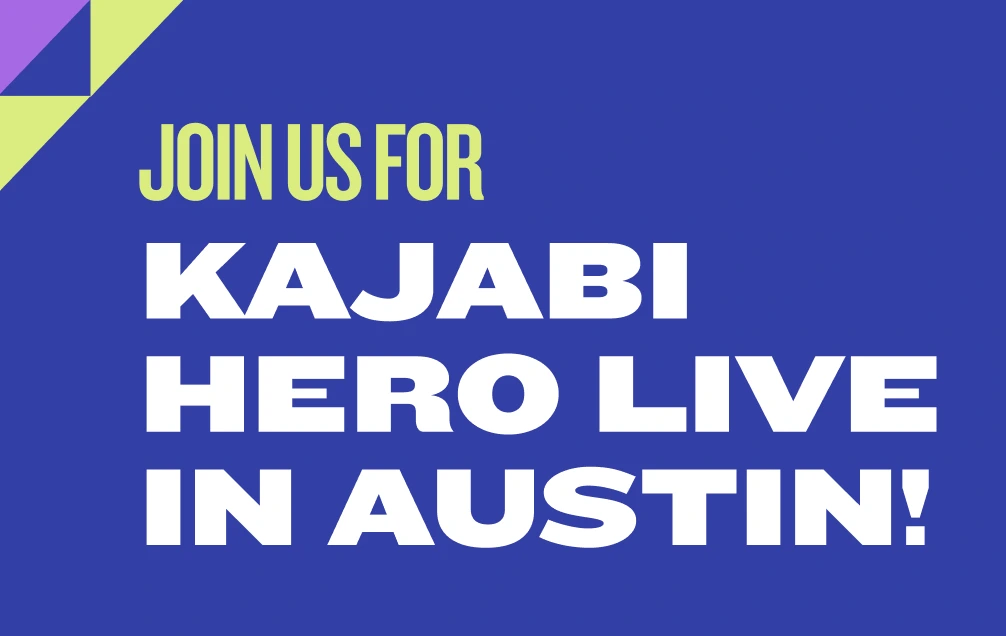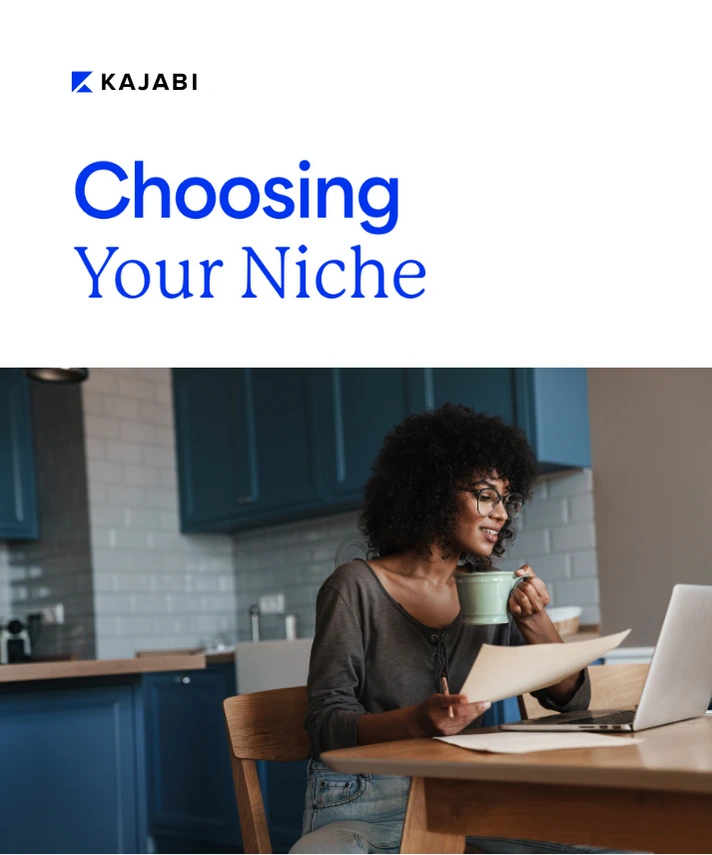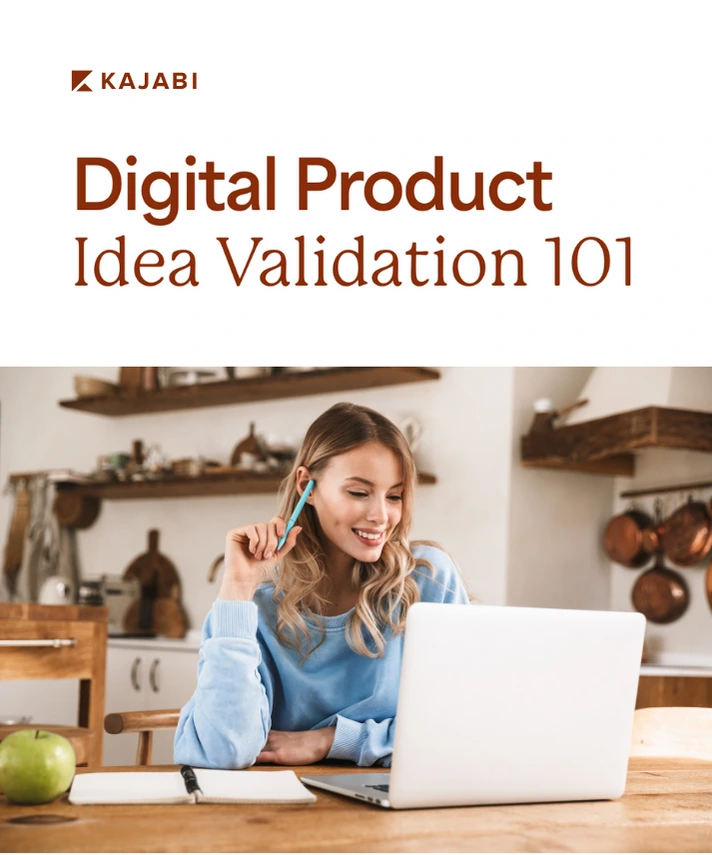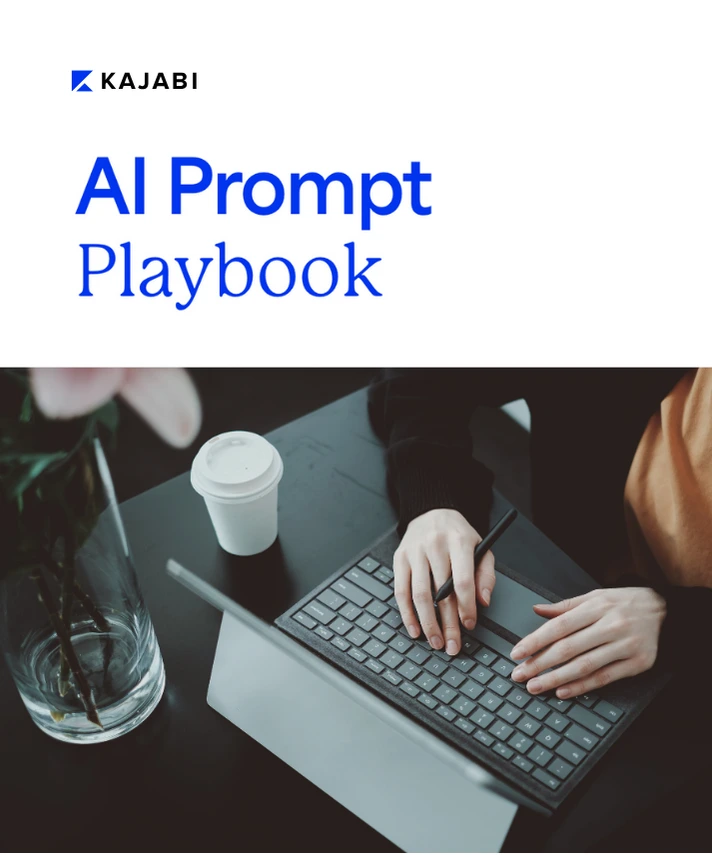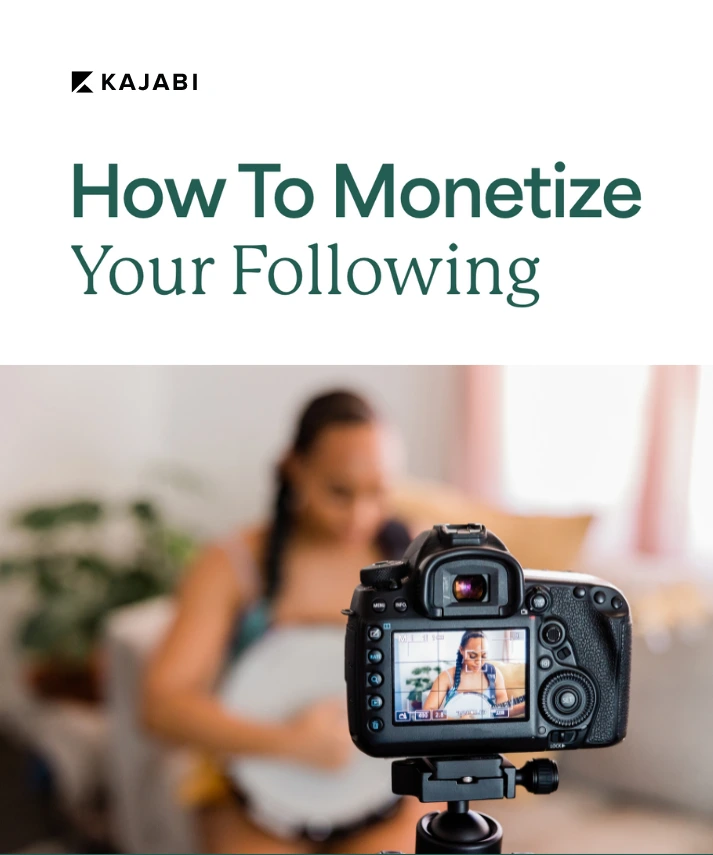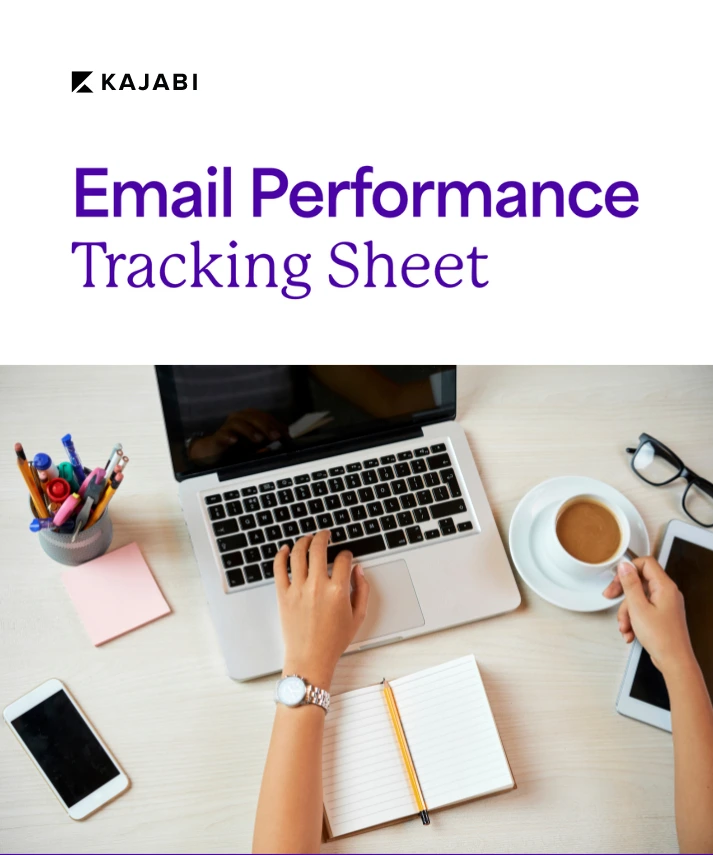Get free expert insights and tips to grow your knowledge business sent right to your inbox.
Have you heard of the recent movement surrounding the creator economy?
Creators have always been a stalwart backbone of the economy, but once the pandemic forced millions to stay at home without the promise of work or the certainty of an income to sustain them, it’s become a real movement. 50 million people have joined the creator economy and are now turning to their hobbies for comfort… and income.
The passion economy is essentially following a path that takes you from passion to profit. And this path isn’t just building a side hustle to pay for your annual vacation. It’s a proven set of steps.
But, as shown by the countless searches surrounding “how to monetize YouTube” and “how to promote on YouTube”, you can have a lot of followers and subscribers and still not replace the income from your full-time job.
So what can you do? In this article, we’ll show you how to get started and how to profit from the creator economy, step-by-step.
Read the 2022 State of the Creator Economy Report to get the latest data on industry trends and growth for knowledge content creators.
What is the creator economy?
The creator economy is a combination of both independent content creators (writers, vloggers, influencers, and so on), as well as the companies that help sustain them. The companies provide the platform, content creation tools, and analytics, while the creators work to monetize themselves and their expertise.
The creator economy was born through the rise of online platforms including YouTube, Instagram, Tiktok, and many more. What started out as sponsored posts gave way to branded shoutouts and continued to grow from there.
The problem was, although these platforms allowed content creators to amass a large following, they didn’t really give them much in the way of tools for monetization. (YouTube is the exception.)
Vine, the short-lived Twitter-backed video service, perfectly illustrates this. Vine had as many as 200 million users at one time and was the springboard for many of today’s top influencers.
But over the course of three and a half years, a lack of direction in terms of what Vine’s actual end-goal was, as well as flagging support for content creators caused its users to abandon ship, particularly as apps like Instagram and Snapchat began to roll out more features and attract more users.
In order to thrive, the passion economy needs creativity and a platform on which to share it. It also needs to be able to attract an audience that’s eager to see that creative output and learn more about it. Once you have all of those things in place, the economy begins to grow and expand.
What are the benefits to earning your income in the creator economy?
Becoming a content creator in the knowledge economy offers a host of benefits that go beyond the income you can generate. You can become a recognized authority in your chosen field or niche, keeping your name top-of-mind for prospects looking to hire or consult with an expert.
Secondly, you also can validate your customers’ decision to buy from you. No matter what you have to say or share, being a content creator has an enormous number of perks that further cement your reputation as you continue to publish.
In other words, the more relevant and impactful the content you produce, the more you will grow as an influencer and as the name to know in your respective niche.
Think it’s not possible to transform something you’re knowledgeable about or something you enjoy into an income? Take a look at these examples:
Scottish pipe band drumming with Rhythm Monster

There are plenty of courses online that will teach you the basics of drumming. But what about Scottish pipe band drumming? If you’ve fallen in love with the beat beyond the bagpipes, this is the course for you.
With hundreds of high quality videos, tutorials and methodologies from the best pipe band drummers, this membership includes live streams, drum scores, technique builders, and more, delivered across any device, 24 hours a day, 7 days a week.
Rhythm Monster, the company behind the course, helps users of all skill levels enjoy and share the “reflection of a culture in its drumming.” They’re fostering a passion for music and culture while revolutionizing the standards of teaching to fit a 21st century process — accessible and accommodating to anyone, anywhere, anytime.
The seasonal diet

Sarah and Peter both suffered from a variety of gastrointestinal issues, with their doctors chalking it up to everything from IBS to a gluten allergy. After a wake-up and a break-up, their discovery of a plant-based diet ultimately brought them back together for good.
Today, Sarah and Peter help people discover all the benefits of going plant-based, from going off of medications to lowering cholesterol to shedding pounds.
From courses that help you cleanse your body and start over fresh to tips for getting your partner on-board your plant-based lifestyle, meal planning, and more, this couple truly epitomizes what it means to be plant-powered!
Of course, there are plenty of courses out there that teach you how to play the drums and eat a plant-based diet. So what makes these examples particularly notable?
They’ve gone further than just a broad topic like drums or going vegan. They’re focused on Scottish pipe band drumming and plant-based diets for couples. They’ve discovered their passion and now they’re turning it into profits in the knowledge economy.
How can people earn in the creator economy?
As a content creator, your work involves brainstorming and developing engaging content that fits into your overall marketing strategy. You have to understand what kind of content works best for your intended audience, the platform you’re using and your overall strategy.
For example, if you want to show off your killer guacamole recipe, an unboxing live on YouTube isn’t going to generate much excitement, whereas if you want to show off the features of the latest gaming console, an unboxing is precisely what you’d want to use to show viewers what’s included and how to set it all up for the first time.
But understanding what type of content promotion method works best isn’t enough. To make it big in the knowledge economy, you must also understand what works best on each platform. A meme shared on Instagram will go much further than a whitepaper shared on the same platform. Conversely, LinkedIn is not the place to share memes, but a whitepaper would definitely get picked up and shared.
In the same way that you set an end goal for your marketing campaigns, you need to set a goal for every piece of content you create. Ask yourself how it fits into your overall goal of promoting yourself as an influencer, and why people should pay attention to what you have to say.
How to monetize your content
There are a variety of ways to monetize your content, but they depend heavily on the end goal you have in mind for it. For example, if your goal is to become a recognized and credible authority in your field, you wouldn’t want to mention direct competitors as an affiliate and then send people to buy from someone else in your industry.
Here are some strategic ideas you can implement right away to monetize your content.
Subscription content
If you have unique experience, skills, and perspectives that people are willing to pay for, you can convert those into a reliable income over time.
In-depth and specialized content (like Scottish drums and plant-based diets for couples) is the kind of thing that you can’t readily find or learn from YouTube videos or articles alone. So whether you offer your content as a newsletter or a course (or both), people will pay you for information, research, instruction, or other details that they can’t find anywhere else.
Donations
Pledging anywhere from a small to a significant chunk of money to support your favorite artists, authors, and other content creators has quickly become a lucrative option for many. By creating various donation “tiers” that give fans and followers access to more perks, each person is able to pay what they can afford and receive benefits equal to their investment.
Sponsored Content
Before you go blanketing your site with random ads, consider sponsored content. This gives brands the ability to get in front of your audience with relevant videos, content, or other information.
Of course, you’ll want to take steps to ensure that the editorial quality of the sponsored content is just as good as your normal content. Otherwise it will look and read like an advertisement or a sales pitch, and people will question spending money with you.
Consulting
For some people, it’s not enough to have access to your courses or membership. They want more in-depth one-on-one consulting or group coaching.
This is exactly how the Seasonal Diet couple has transformed their product from an entirely course-based membership to a membership with more of a consulting focus. They realized that not all couples follow the same path when it comes to taking the plant-based plunge. By offering consulting, they diversify their income sources while solidifying their standing as experts.
Affiliate marketing
If you have products in your niche that you use and love, it may be worth recommending them to your subscribers. As an affiliate, you’ll earn a commission every time someone buys using your affiliate link.
Commissions can vary widely from 1% to 90%, and some industries can generate more profits from this than others. But if you’re teaching users how to use a particular tool or software, it makes sense to be an affiliate for it.
Selling your own products
Beyond selling a course or a membership, you can also create additional digital products and sell them independently. Your advice, original research or surveys, and other insights can be extremely valuable to those who are looking to learn from you.
For example, premium reports, e-books, and even merchandise can all sell well depending on your niche.
Well-known blogger Katie Wells of Wellness Mama turned her love of natural, healthy foods into the creation of Wellnesse, her own line of personal care products. Blogger Jenny Lawson turned her blog into several bestselling books as well as a Zazzle store, where users can get their hands on artwork like coffee cups inspired by her art and stories.
What types of content should you create?
It’s important to keep in mind that writing blog posts or creating videos aren’t your only options for interacting with your audience and promoting yourself in the passion economy. There are a variety of types of media, each attracting a different type of user across various stages in the customer journey. For example:
Articles - A great way to introduce beginners to your topic, especially if they offer bite-sized tips like “how to get started with ____ in 4 easy steps.”
Tutorials - In-depth walkthroughs teaching specific lessons that a simple article or blog post can’t really cover.
Unboxing- Showing off a new or trendy product: how to set it up, how to use it and how to get the most out of it.
Blog posts - A tried-and-true way to showcase your expertise. Blog posts can be articles, tutorials, infographics, and reviews, but are most often small opinion pieces.
Vlogs - Just like a blog post, but in video form. Not quite as detailed as a tutorial but informational and educational (or entertaining) nonetheless.
Q&A - A question and answer session. It can be in the form of a FAQ, or you can go one step further by doing a live broadcast or webinar where you take questions from the audience and answer them in real-time.
Infographics - Graphics that distill statistics or other important information into visually digestible chunks.
Interviews - A one-on-one Q&A with another expert in your industry (or you yourself can be the interviewee!)
Webinars - A cross between a tutorial and a Q&A, webinars teach users how to do something step-by-step in a live or pre-recorded training session.
Guides - A more in-depth variation of an article, a guide approaches a topic from a certain angle and then goes into great detail on how to get the most of it, how to use it, why it’s important, and more.
Reviews - A helpful look at the pros and cons, pricing, functionality, and other features of a given product or service.
E-Books - More in-depth than a guide, an e-book can span several chapters just like its print counterpart.
User-generated content - This is content created and shared by your users with the rest of the group. Common examples of user-generated content can include: recipes, photos, memes, artwork, and other creative outlets.
Live streams - A live broadcast that shows a product, shares instructions, or gives people an inside look at what you do.
Case studies - Detailed write-ups of clients or others you’ve taught and helped, and what they’ve done as a result of your teaching, subscription, or membership.
Memes - Fun (and sometimes scarily accurate) images that are culturally understood and easily shared.
Whitepapers - A detailed look at a specific product or service’s benefits and why the user should consider it in their decision-making process
Behind-the-scenes looks - A closer look into the development process or techniques demonstration how something is made or accomplished
Someone searching the basics on “how to switch to a plant-based diet” for example, might look for articles, webinars, guides, and ebooks, whereas someone wanting a more in-depth meal plan would likely search out reviews, guides, or even Q&As.
Knowing when, where, and how to use each piece of content is crucial to your success in the knowledge economy.
Of course, you may think, “Well, if all you have to do is create content, that’s easy enough!” But that doesn’t quite paint an accurate picture of what a full-time income in the passion economy looks like.
Why it’s not enough just to create content
Even if you do a stellar job creating content, simply creating it and publishing it won’t make prospects beat a path to your door. You also have to know how to market it to the right audience at the right time.
With that being said, the most successful content creators have five integral traits they’ve developed and refined over time that allows their content to truly perform at a whole other level than your basic blog post or article.
Even if you’re just starting out, you’ll learn how to develop and cultivate these habits over time, so if you read one and think, “I don’t know how to do that very well,” take heart. Knowledge is truly built through experience. So the more content you create, the better you become at it — and at connecting with your target audience!
Read and research often
Great content creators are willing to do the extra legwork and put in the time it takes to create and solve their audience’s problems.
By continuing to read, research and familiarize yourself with changes, trends and other relevant news, you continue to bring your subscribers and members the very latest in a way that they can learn from it and apply it to their own lives.
Know good content when you see it
This happens especially on Twitter and Instagram, but great content creators have a keen eye for what constitutes good content. When they find it, they actively look for ways to engage with and learn from each other.
No content expert is an island, especially in the passion economy, so don’t hesitate to reach out to other creators to forge a collaboration or joint venture — especially if the other creator’s content has a tendency to go viral.
Understand the purpose behind the content
Every piece of content you create has a mission. Is yours to drum up more brand awareness and exposure? Get more sales? Grow your audience? All of the above? Knowing what you want your content to do and how it fits into your end goal are crucial for your success in the knowledge economy.
Keep a finger on the pulse of new trends and changes
The best content creators know when trends are changing and algorithms are updating. Just as many content creators ultimately dropped Vine in favor of Facebook, Snapchat, and YouTube (and more recently, Instagram and TikTok), knowing when to cut loose from an underperforming platform is just as important as knowing when to embrace one and cultivate your presence on it.
Be able to consistently measure your success and learn from your mistakes
Do you know which pieces of your content are performing the best? Do you know what content really resonates with your subscribers? How can you be sure?
Every content platform has varying degrees of analytics and tools you can use to gather this information. Don’t hesitate to take advantage of them!
Not every piece of content will be perfect, but through diligence and careful monitoring of your analytics and consistent publication with a goal in mind, you can ensure that each one you create has the potential to soar on its own merits.
Changes in the Creator Economy
Kajabi founder and former CEO Kenny Rueter and former President Jonathan Cronstedt take on discussing the direction and changes of the creator economy. Kajabi President Sean Kim moderates the discussion about the biggest changes in the creator economy, what has stayed pretty constant in the knowledge economy, strategies for creators getting started, the importance of subscriptions for creators, and the differences between amateur creators and professional creators.
How do I get started?
The good news is that you can get started right away and become a part of the creator economy with Kajabi. Our all-in-one suite of tools helps you to create, sell and market your knowledge in a way that’s intuitive and user-friendly.
What’s more, with Kajabi, you own the channel. You don’t have to worry about algorithm changes stripping away your audience or metrics, making it impossible to monetize your expertise. No matter what you have to say or share, Kajabi makes it easy for you to share your knowledge and talents with the world.
Start your free 14-day trial of Kajabi today!
Join us for live Q&A webinars every day, Monday through Friday. Register today to learn everything you need to know to succeed as a knowledge entrepreneur, including selling products, Kajabi themes, pipelines, webinars, and the Kajabi Partner Program.
Find more blog posts by category:
Create Your Product
Build Your Business
Grow Your Business
Kajabi News
Self-Made


